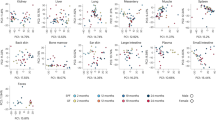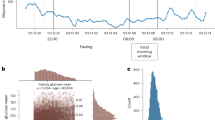Abstract
ACCORDING to the metabolic studies of Stetten and Boxer1, deuterium is incorporated into liver glycogen in the alloxan diabetic rat at a higher rate and at a greater concentration than that achieved in the normal animal. Their previous studies showed that when glycogen was synthesized directly from dietary glucose in a medium of heavy water it was poor in deuterium, whereas glycogen synthesized from fragments smaller than hexose was rich in deuterium. They concluded that the diabetic animal was able to synthesize more liver glycogen from fragments smaller than hexoses than was the normal, non-diabetic rat.
This is a preview of subscription content, access via your institution
Access options
Subscribe to this journal
Receive 51 print issues and online access
$199.00 per year
only $3.90 per issue
Buy this article
- Purchase on Springer Link
- Instant access to full article PDF
Prices may be subject to local taxes which are calculated during checkout
Similar content being viewed by others
References
Stetten, jun., DeW., and Boxer, G. E., J. Biol. Chem., 156, 271 (1944).
Cramer, F., “Paper Chromatography” (Macmillan, 1954).
Partridge, S. M., Nature, 164, 4167 (1949).
Fruton, J. S., and Simmonds, Sofia, “General Biochemistry” (Wiley, 1953).
Author information
Authors and Affiliations
Rights and permissions
About this article
Cite this article
MUELLER, I., PHILLIPS, J. Pentose Metabolism in Diabetic and Normal Rats. Nature 179, 1194–1195 (1957). https://doi.org/10.1038/1791194a0
Issue Date:
DOI: https://doi.org/10.1038/1791194a0
Comments
By submitting a comment you agree to abide by our Terms and Community Guidelines. If you find something abusive or that does not comply with our terms or guidelines please flag it as inappropriate.



